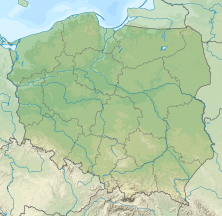Pustków concentration camp
| SS-Truppenübungsplatz Heidelager | |
|---|---|
|
SS-officer training camp Concentration camp |
|

Heidelager Museum
|
|
| Coordinates | 50°8′25″N 21°29′20″E / 50.14028°N 21.48889°ECoordinates: 50°8′25″N 21°29′20″E / 50.14028°N 21.48889°E |
| Operated by | Schutzstaffel (SS) |
| Commandant | Oberführer-SS Bernhardt Voss |
| Original use | Slave labour, POW internment |
| Operational | January 1940 – August 1944 |
| Inmates | Jews, Poles, Russians |
| Killed | 15,000 total: 7,000 Jews, 5,000 Soviets, 3,000 Polish |
| Liberated by |
|
SS-Truppenübungsplatz Heidelager was a World War II SS military complex and Nazi concentration camp in Pustków and Pustków Osiedle, Poland. The Nazi facility was built to train collaborationist military units, including the Ukrainian 14th Waffen SS Division "Galician", and units from Estonia. This training included killing operations inside the concentration camps – most notably at the nearby Pustków and Szebnie camps – and Jewish ghettos in the vicinity of the 'Heidelager'. The military area was situated in the triangle of the Wisła and San rivers, dominated by large forest areas. The centre of the Heidelager was at Blizna, the location of the secret Nazi V-2 missile launch site, which was built and staffed by prisoners from the concentration camp at Pustków.
The Nazis originally planned to erect a large SS training camp near Pustków with barracks, warehouses, and buildings for the intelligence services. The facility was built by order of Reichsführer-SS Heinrich Himmler under provision OKW No. 3032 of 21 December 1939, which allowed for construction of an SS military training centre in the area eastward of Dębica in Generalgouvernement Polen. The training site was to be built as a barrack camp with four ring roads (called: Lager Flandern). It was planned to be completed on 1 October 1940 for two reinforced infantry regiments. To accomplish this, about a dozen villages near Pustków were evacuated and then razed.
...
Wikipedia

